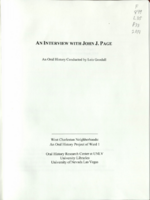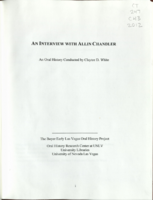Search the Special Collections and Archives Portal
Search Results

Transcript of interview with Marty Walsh by Suzanne Becker, July 19, 2007
Date
Archival Collection
Description
In 2002, Marty Walsh and her husband purchased a home in the John S. Park Neighborhood. Three aspects attracted them to their 1941-built home: the quality construction; the aesthetics and details of the house; and the "old-fashion human element" that she associated with her grandparents. Marty describes their relocation to Las Vegas after living for nine years in Ireland and her joy of discovering the John S. Park community. For her there is a neighborliness that they found in the form of the Neighborhood Watch. She feels the neighborhood still has work to do, but the gentrification has had splendid results as new "urbanites" replace original homeowners. From her artist point of view, she also provides thoughts about the impact the artist community of musicians, painters, and creative artists has had on the neighborhood. Even though she is relatively new to Las Vegas, she is well researched in the historic aspects of John S. Park location: once a fertile plot of land where
Text

Transcript of interview with John Page by Lois Goodall, April 16, 2014
Date
Archival Collection
Description
John J. Page attended 13 schools before graduating from high school in the Ozark Hill Country of Oklahoma. Although he engaged in no combat, he was drafted into military after completing two years of college at the University of Oklahoma in Norman, Oklahoma. After his discharge from the U.S. Air Force, he helped his wife, Reitha, finish the credits she needed to complete her degree, and he then worked to complete his in Norman. Following his graduation, the couple relocated to Las Vegas in February 1959, when Reitha found a job at Washington Elementary School. In Las Vegas John completed his practice teaching under master teacher Lamar Terry at Twin Lakes Elementary School and under supervision of Dr. Holbert Hendrix at the University of Nevada, Las Vegas. John held his first teaching assignment, fifth grade at West Charleston Elementary School (later called Howard Wasden Elementary School), for 27 years before transferring with his principal to Helen Marie Smith Elementary School. For a time John and Reitha rented a small house at the comer of Bonanza Road and First Street that was owned by entertainer Horace Heidt. They bought their first house, a Pardee Park Home one block north of Tom Williams Elementary School in North Las Vegas, because Reitha taught there, and she and the children could walk to school together. In 1973 they bought their current house on El Cortez Avenue in the Westleigh tract. Page not only worked in Ward 1 for 27 years of his 36-year teaching career (1959-1995); he and his family also lived in Ward 1 for more than forty years. As a teacher in the school that served the wealthiest Las Vegas families, Page witnessed the many ways that generous donations of time, money, and talent matter to schools, students, and teachers. As an early resident of Westleigh tract, Page saw dramatic changes to the area's built environment. And as a longtime educator, Page observed several cycles of experimental instmctional techniques and philosophies.
Text

Transcript of interview with Allin Chandler by Claytee White, February 5, 2013
Date
Archival Collection
Description
Another member of Rancho High School's first graduating class of 1962, Allin Chandler charted a course that took him from school football to a distinguished career as a teacher, principal, and Executive Director for the Clark County Association of School Administrators. Allin moved to Las Vegas from Texarkana, Texas with his mother in 1958, joining his father who was serving in the Air Force and stationed at Nellis AFB. Starting 9th grade at J.D. Smith Junior High and continuing on to Rancho the following year. Still actively involved in school athletics, Allin quickly discovered his talent and love for maths and science and eventually earned his degree in math and education. The stories Allin shares in this interview paint a vivid picture of how an intelligent and motivated young man can succeed - and how the class-free world of Las Vegas in the 1950s and 60s offered opportunities that he would never have had in class-conscious world of the South.
Text

Gene Leavitt interview, February 28, 1979: transcript
Date
Archival Collection
Description
On February 28, 1979, collector Monte Leavitt interviewed Gene Leavitt (born October 6th, 1923 in Mesquite, Nevada) at his home in North Las Vegas, Nevada. In this interview, Mr. Leavitt talks about his career as a truck and bus driver. He also talks about the life in Southern Nevada, the soldiers stationed here, and gambling.
Text

Relda W. Leavitt interview, March 18, 1976: transcript
Date
Archival Collection
Description
On March 18, 1976, collector David Steele Broussard interviewed Relda Whitney Leavitt (born April 3rd, 1917 in Saint Thomas, Nevada) at her home in Las Vegas, Nevada. In this interview, Mrs. Leavitt discusses growing up in Saint Thomas, Nevada before her family moved to Las Vegas. She also discusses moving to Las Vegas, Nevada and her family’s dairy business in Whitney, Nevada. She speaks about the different changes and growth she has seen in Las Vegas over the years.
Text

Jean Sherman McColl interview, March 1, 1977: transcript
Date
Description
On March 1, 1977, collector Sam C. Melchiome Jr. interviewed Jean McColl (born May 24th, 1931 in California) at her home in Las Vegas, Nevada. In this interview, Jean McColl discusses growing up in Searchlight and then Las Vegas, Nevada. She discusses how her family came here as well as the many changes she has seen through the decades living in Las Vegas, Nevada.
Text

Transcript of interview with Evelyn Miller McDonald by Maylene C. Cabatingan, February 26 & 27, 1980
Date
Archival Collection
Description
On February 26, and 27, 1980, Maylene C. Cabatingan interviewed Evelyn Miller McDonald (born 1905 in Alderson, West Virginia) about her life in Las Vegas, Nevada. Also present during the interview is Maylene’s step-father (name unknown) who occasionally participates in the conversation. At the time of the interview, McDonald had lived in Nevada for over seventy-two years and described early Las Vegas as a small-town railroad community with few amenities. McDonald discusses her occupational history, and how her father started the first car garage in Las Vegas. She goes on to talk about the impact of the Great Depression on Las Vegas and how Hoover Dam’s construction reduced the severity of the financial depression in comparison to other cities. She then recites the hotels that were built and the appeal that Vegas had to tourists and divorcees. McDonald later discusses how prostitution was accepted by the community, and recalls a story about how local businessmen rallied together to ensure that a minister would preach the funeral for a young woman who had died, despite being a prostitute. McDonald concludes her interview with a brief discussion of her goals in life and her pride in her daughters.
Text

Julie McDonald interview, March 14, 1981: transcript
Date
Archival Collection
Description
On March 14, 1981, Michael Richardson interviewed Julie McDonald (b. 1945 in Torrance, California) about her childhood and life in Las Vegas, Nevada. McDonald shares her first impressions of Las Vegas, her schooling and the location of residential areas. Throughout the interview, McDonald also goes into detail concerning her occupations at the Guild Theatre, her secretarial work at Nellis Air Force Base, her singing career and being a “21” dealer. McDonald discusses the changes in the gaming industry, particularly the incorporation of women dealers, the use of the silver dollar and the requirements for dealers. McDonald ends by discussing housing, major happenings within Las Vegas, recreation as a kid and mass media in early Las Vegas.
Text

Rodel Fuentes oral history interview: transcript
Date
Archival Collection
Description
Oral history interview with Rodel Fuentes conducted by Tracy Fuentes on December 4, 2021 for Reflections: The Las Vegas Asian American and Pacific Islander Oral History Project. Rodel Fuentes tells stories of his upbringing in Manila, Philippines, where he was raised in a shared family home amongst his parents, siblings, aunts, and uncles. He talks about his parents' immigration to the United States and how he later joined them in Los Angeles, California where he met and married his wife. Rodel Fuentes shares the couple's decision to move to Las Vegas, Nevada, his work at Dunn Edwards paint company, and how he became a licensed general contractor and real estate agent where he now owns his own company. Rodel Fuentes discusses his thoughts on Las Vegas' diversity, affordability, restaurants, and Asian community. He also talks about experiencing anti-Asian hate, worsened by misconceptions and discrimination that came from the COVID-19 pandemic.
Text

Jill Roberts oral history interview: transcript
Date
Archival Collection
Description
Oral history interview with Jill Roberts conducted by Barbara Tabach and Claytee D. White on March 20, 2018 for the Remembering 1 October Oral History Project. In this interview, Jill Roberts discusses her position as the CEO of the Trauma Intervention Program (TIP) of Southern Nevada. She also delves into her part-time work at the coroner's office as a death investigator and discusses her personal background in Las Vegas, Nevada after she moved to the city in 1977. She describes the role TIP had during the aftermath of the October 1, 2017 mass shooting, where well-trained volunteers were dispatched to hotels, hospitals, and anywhere else the survivors reached in order to provide emotional and practical support. Throughout the interview, Roberts emphasizes that the assistance provided to those in a traumatic event depends on each individual's needs. She shares a few examples of what the TIP volunteers had helped with after the shooting, including listening to the survivors' stories as well as providing information on the situation, helping separated loved ones find each other, arranging travel for some survivors to go back to their homes, and procuring clothes and shoes for those who needed them. Roberts also discusses the gratitude TIP had received after the shooting, including the thank you cards sent by Sandy Hook High School.
Text
